Mushkin Reactor 1TB SSD Review
by Kristian Vättö on February 9, 2015 11:32 AM EST- Posted in
- Storage
- SSDs
- Mushkin
- Silicon Motion
- SM2246EN
- Reactor
- Micron 16nm
Random Read/Write Speed
The four corners of SSD performance are as follows: random read, random write, sequential read and sequential write speed. Random accesses are generally small in size, while sequential accesses tend to be larger and thus we have the four Iometer tests we use in all of our reviews.
Our first test writes 4KB in a completely random pattern over an 8GB space of the drive to simulate the sort of random access that you'd see on an OS drive (even this is more stressful than a normal desktop user would see). We perform three concurrent IOs and run the test for 3 minutes. The results reported are in average MB/s over the entire time.
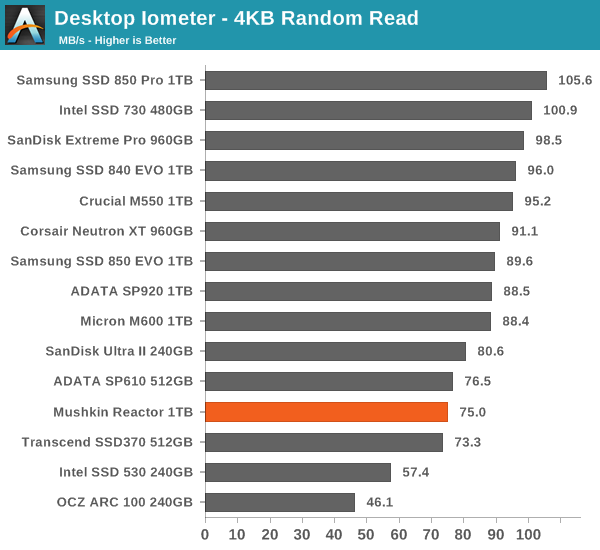
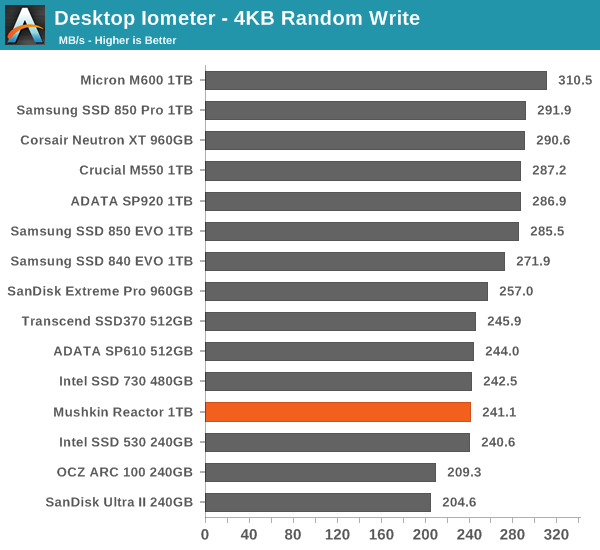
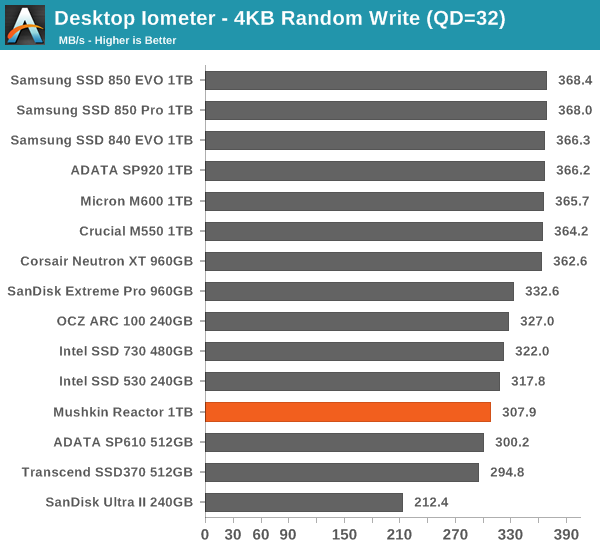
Random performance is typical to SM2246EN, which isn't bad but there are drives with better peak performance.
Sequential Read/Write Speed
To measure sequential performance we run a 1 minute long 128KB sequential test over the entire span of the drive at a queue depth of 1. The results reported are in average MB/s over the entire test length.
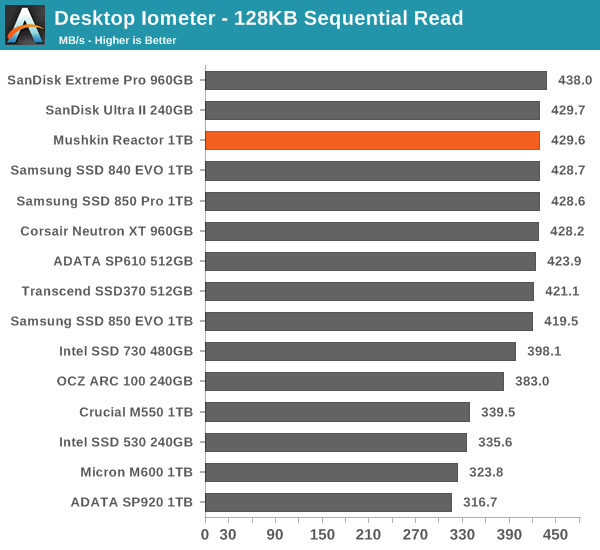
Sequential write performance is a bit lower compared to the rest of the SM2246EN based SSD, which I suspect is due to the additional capacity and the increased LBA tracking due to that.

AS-SSD Incompressible Sequential Read/Write Performance
The AS-SSD sequential benchmark uses incompressible data for all of its transfers. The result is a pretty big reduction in sequential write speed on SandForce based controllers, but most other controllers are unaffected.
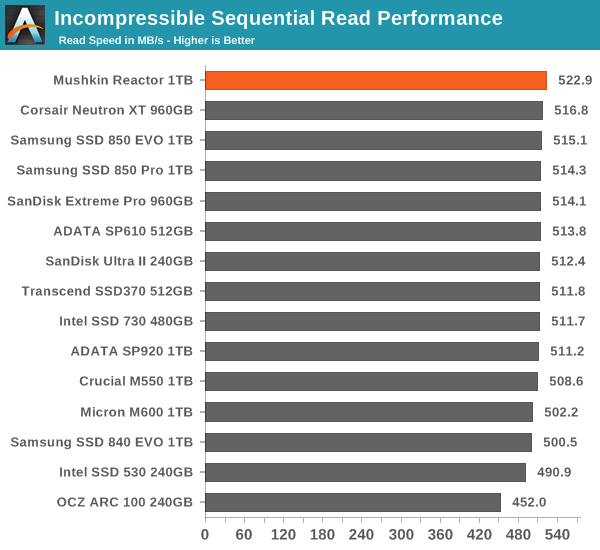
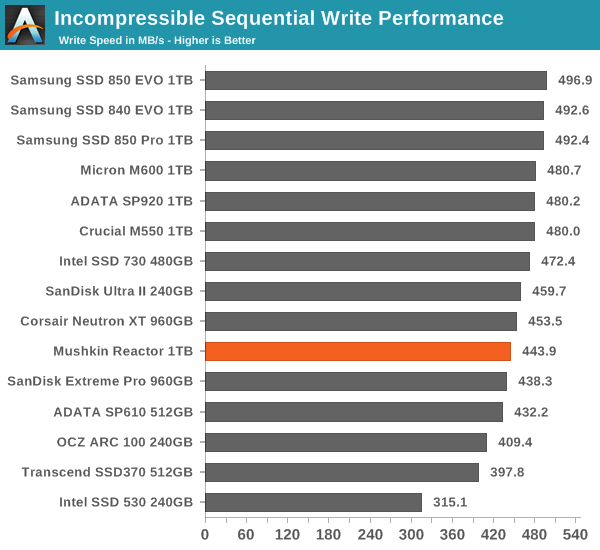










69 Comments
View All Comments
nathanddrews - Monday, February 9, 2015 - link
That didn't stop them from releasing 1TB SSDs for $800, which have conveniently come down...rahuldesai1987 - Monday, February 9, 2015 - link
Samsung 860 Evo is likely to be 2TB.Christopher1 - Sunday, February 15, 2015 - link
Who would need all that space on an SSD save an uber-gamer? I personally put an SSD in my laptop but I download and store all my stuff to an external hard drive that is a USB 3 spinny disk.Greg100 - Tuesday, February 10, 2015 - link
What??? I am still waiting for Samsung PM863 - 3.84TB capacity in 2.5" form factor! The price doesn't matter. I will buy two or three of them.Levish - Thursday, January 14, 2016 - link
Mostly it comes down to supply vs demand, imagine if for example Samsung released a Hypothetical 1TB EVO SATA 6Gbps at $50 - $100 and a pro at $125 - $150 pretty much no one else would sell a consumer / oem SSD.What kills me is the pricing difference of M.2 NVMe disks, other than the initial R&D to produce they should be way cheaper than SATA varieties
Tom Womack - Tuesday, February 10, 2015 - link
1TB is enough for most laptops, and few cases are short enough of space or SATA ports that you can't strap together two 1TB drives in RAID0, so there's very little pressure to produce 2TB drives at less than twice the price of 1TB drives; if you want 4TB of SSD tomorrow you can buy four drives and fiddle around a little with Molex-to-SATA-passthrough power adaptors.Cpt. Obvious - Tuesday, February 10, 2015 - link
There's also a big push for cloud services. Local storage is often seen as unreliable and inconvenient, especially when the user is supposed to be using several platforms to access the same data. And let's be honest, the cloud services are very convenient, when they work.The big problem with cloud storage, in my opinion at least, is bandwidth. For most people It's simply not efficient to work with large volumes of data over the internet. Even many popular games are running into several gigabytes. Recently I reinstalled a game that's a few years old, Borderlands, and the download from Steam was over 12GB. That's not something I'd like to run from a cloud storage. But even then I could fit 80 games of this size on a one TB SSD.
Movies is another subject. A 1080p movie stored in a good quality can be about 20 - 25 GB, so that 1TB drive could house about 40 of these. However movies are generally read sequentially, and they don't need a very high transfer rate so they are prime candidates for storing on cheap HDD's in a NAS and / or using cloud storage.
So where is the multi TB SSD demand in the consumer market today? I think 4K video editing is one of the few cases where consumers may need multi TB SSD's. Note that I say "need" not "want", because I for one sure "want" as large a SSD as I can get for a reasonable price. I might not fill it up, but I still want it...
When it comes to professional use things are a lot different. If you work with huge sets of data you will need both large and fast storage. But then again that is already available, though at prices thats out of range for most end users.
cm2187 - Friday, February 13, 2015 - link
Particularly upload bandwidth. In my country most optic fibre providers only have upload speeds a tenth of the download speed. Most pictures today are 2-6MB out of the camera (mobile to DSLR). A photo roll from a birthday or a trip can be pretty long to upload. And we are not even talking audio or video.Plus there is the trust issue. Do you really want to upload all your private life to the internet?
Christopher1 - Sunday, February 15, 2015 - link
Actually, a 1080p in H.265 format (the one that people are switching to) should be only 1GB, tops for a two-hour movie in 23.9-24 fps at a pretty high Kbps.Yes, movies are usually read sequentially but the problem is that many drives do not store data sequentially.
Every single time I download a TV show, I have to defrag the hard drive or the file itself to get it sequential on a spinny disk hard drive and play it's best.
Christopher1 - Sunday, February 15, 2015 - link
Local storage is one of the most reliable things in the world today, especially since a lot of cloud hosters are now doing the insanity of removing anything that is 'flagged' by their systems as 'possibly pirated'. I just would not trust them with my data.